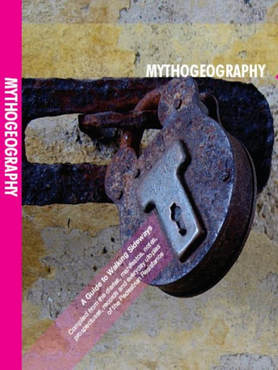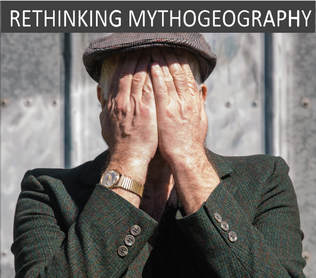Only Conjugate! That is the whole of my sermon.“Only connect! That was the whole of her sermon. Only connect the prose and the passion, and both will be exalted, and human love will be seen at its height. Live in fragments no longer. Only connect, and the beast and the monk, robbed of the isolation that is life to either, will die” (From Chapter XXII of E. M. Forster’s novel of 1910, “Howards End”) Since they were published in 1910, Forster’s famous lines have been picked up, especially within left/liberal circles, as a rallying cry, not only for generally better connections to be made within society as a whole but, as his use of the words
“prose and passion” suggest, it is also a plea for people to connect the rational and emotional aspects of their being. But is the rallying call “Only connect!” really the one that we need today? The contemporary Italian philosopher Franco 'Bifo' Berardi feels that 'connection' in the modern digital age — and this caveat is important for we are no longer in 1910 — has become all about smooth, frictionless, punctual and repeat-able interactions; it’s all about creating compatibility between the machine and society’s various parts according to pre-established technical/societal standards; it’s all about speed of connection and about becoming highly responsive to fast flows of rapidly changing information. It is vital to see that understood in this way connection leaves “no margin for ambiguity in the exchange of messages, nor can intention be manifest though nuances.” The power of the pre-determined code becomes utterly dominant. Given this I’m sure all of us can see why the phrase “only connect” can, today, be received and promoted with gusto by certain sectors of industry and society. Most of us can see in one way or another that the digitization and automation of our world is beginning to stop us from engaging in something central to human-being, namely a deep involvement in the countless continuous processes of slow and deeply nuanced becoming. But the way things are unfolding for most people today means there is set aside no time — nor are we being given the resources (financial and social) to set aside such time — to engage in a reflective interpretation of our world. There is only time for “connection” in order to facilitate the constant high-speed transmission of digital information. This is why Bifo’s understanding of “conjunction” is so very helpful. Bifo suggests that conjunction is best thought of as being “. . . the meeting and fusion of round or irregular bodies that are continuously weaseling their way about without precision, repetition, or perfection” (Berardi, p. 22) As Bifo also writes: “Conjunction . . . can be viewed as a way of becoming other. Singularities change when they conjoin, they become something other than what they were before, in the same way as love changes the lover or the conjunctive composition of a-signifying signs gives rise to the emergence of previously inexistent meaning” (Berardi, p. 21). And this, in turn, is why it seems to me that Phil Smith’s books Mythogeography and Rethinking Mythogeography are so helpful because they offer us a number of practical, creative, sustained, subversive and enjoyable ways to conjugate. So, if I may dare, I’d like to re-present to you Forster’s famous words in a fashion suitable to our own age: Only conjoin! That is the whole of my sermon. Or, to pick a more evocative word with the same Latin root (from iungere "to join together, unite, yoke"): Only conjugate! That is the whole of my sermon. Andrew J. Brown, Cambridge, June 2018 —o0o-- Triarchy Press is very grateful to Andrew Brown for this contribution to the Idioticon. Andrew is a Unitarian minister in Cambridge, UK with sympathies towards Christian atheism, religious naturalism & communalism. Jazz bassist, photographer, cyclist & walker. References:
Franco “Bifo” Berardi: AND: Phenomenology of the End, Semiotext(e), MIT Press, 2016 Phil Smith: Mythogeography, Triarchy Press, 2010 Phil Smith: Rethinking Mythogeography in Northfield, Minnesota”, Triarchy Press, 2018 |
ExplorePSIt might help here to know that what was going on in my head when I wrote the piece was a remembrance of a (to my mind) splendid translation of Virgil's first Georgic by David Slavitt. In C. D. Lewis' fairly straightforward translation lines 50-52 of Virgil's advice to would be farmers reads very simply:
"But plough not an unknown plain: First you must learn the winds and changeable ways of its weather, the land's peculiar cultivation and character." In one sense it is straightforwardly wise advice. You may have to hand general unifying texts about agriculture which tell you how to till this type of land and that type of land, you may even have many years of farming experience in another place but this is never sufficient if you are to be successful farmer in this new landscape. You must always recce this land actually before you and, before you begin, you must make slow, time-consuming efforts to know it in all its contexts, i.e. with its different seasonal patterns of wind, rain, sun and snow. But, as Slavitt realises, not all of us are farmers (or going to be farmers) and so he offers the modern (mostly urban reader) the same lines in the following fashion, one which he freely admits is also a kind of commentary upon it: All knowledge is hard won; a farmer must know his field, its soil, its weather, and from years of trial and error he learns which land grapes thrive upon, which will produce corn better or earlier so he can beat the market's glut. A week, a weekend can make the difference between comfort and bare survival, survival and loss. It is all particularity -- as in grammar: to farm is to conjugate irregular verbs. Beyond the rules, you must learn the brute words themselves by rote and with stern hunger for schoolmaster." (p.94) I loved the idea that deeper (perhaps even truer) knowledge only comes about with the kind of slowness of required when one is learning to conjugate irregular verbs. Andrew Brown |



